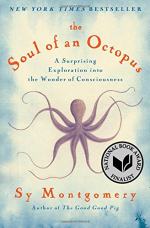|
This section contains 929 words (approx. 3 pages at 400 words per page) |

|
Three fifths of octopuses’ neurons are not in the brain but in the arms.
-- Sy Montgomery
(chapter 1 paragraph 1)
Importance: Montgomery illustrates the octopus’ incredible characteristics throughout the work. She encapsulates the animal's extraordinary nature in facts such as this one.
Feelings of awe are known to expand the human experience of time availability. So does 'flow,' the state of being fully immersed in focus, involvement, and enjoyment. Meditation and prayer, too, alter time perception.
-- Sy Montgomery
(chapter 2 paragraph 1)
Importance: Montgomery explores consciousness from several perspectives, as illustrated here. She experiences awe and an expanded experience of time when in contact with the octopuses. Examining these altered states of consciousness allows Montgomery to understand more about consciousness in general.
Assessing the mind of a creature this alien demands that we be extraordinar[ily] flexible in our own thinking. Marine biologist James Wood suggests our hubris gets in our way.
-- Sy Montgomery
(chapter 2 paragraph 4)
Importance: The author points out here the priority of thinking in the...
|
This section contains 929 words (approx. 3 pages at 400 words per page) |

|




